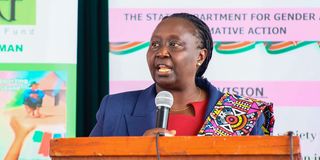Beacon of hope at last: West Pokot unveils lifeline for GBV survivors

Gender Cabinet Secretary Hanna Cheptumo during the second bi-annual national gender sector working group meeting at Safari Park Hotel, Nairobi, on June 5, 2025. She also attended the launch of a GBV rescue centre at Kapenguria County Referral Hospital in West Pokot.
What you need to know:
- New GBV rescue centre in West Pokot offers medical, legal, and psychosocial support to vulnerable survivors.
- Hope Centre opens to address GBV crisis, restore survivor dignity, and improve access to justice.
It is a sigh of relief for gender-based violence survivors and those at risk in West Pokot after a rescue centre was set up in Kapenguria County Referral Hospital.
The rescue centre will offer comprehensive services to survivors of gender-based violence (GBV), including medical treatment, psychosocial support, legal aid referrals and shelter.
Through the Accelerate Programme, courtesy of the Embassy of Denmark and the Ministry of Health, the centre is expected to improve response time and outcomes for those seeking help.
West Pokot has long struggled with high rates of GBV, worsened by cultural practices, economic hardship, and limited access to survivor support services. Until recently, many survivors had to travel hundreds of kilometres to seek help, often discouraged or unable to do so. The centre, therefore, represents a critical step towards bridging that gap.
The centre was funded by the Embassy of Denmark in partnership with the national and county governments. It has professional staff and is linked with local authorities. With its launch, Kapenguria now positions itself as a champion of gender justice and seeks to protect and empower vulnerable residents.
John Chege of the Gender Violence Recovery Centre said survivors would receive focused care. “Even one incident of GBV is regrettable. People will receive specialised care. It is a safe environment; it is a room to ensure survivor dignity is upheld. People will receive treatment and counselling. We also have a child therapy room. The centre will receive cases from other sub-county hospitals.”
He said the number of cases reported has increased. “People are now informed and when violated, they go to hospital. Others need a follow-up to their treatment and go to psychologists and community health promoters.”
Sylvester Kibanda, a clinician and GBV focal person at the county referral hospital, said they receive different types of GBV. He said the centre will improve services and keep records and documentation.
“We receive them with dignity. The client is given a consent form. We assure you of your safety, privacy and have highly skilled people. You will go through an examination. A verbal or written consent will be explained to the client in a manner he or she understands. Our objective is to restore dignity, hope and justice. We link with other departments like the police, children and shelters like Murpus.”
Gender Cabinet Secretary Hanna Wendot Cheptumo and Principal Secretary Anne Wang’ombe presided over the launch of the facility, named Hope Centre. Also present was West Pokot Governor Simon Kachapin, who lauded the national government’s efforts in enhancing community protection and pledged continued support to community outreach and resource allocation. He regretted the high number of reported cases.
“For far too long in our communities, both genders have endured violence in silence; therefore, this centre gives them a voice and, more importantly, a lifeline from such atrocities,” he said.
Ms Cheptumo emphasised the urgent need to tackle GBV, calling it a national crisis that requires grassroots engagement and systemic response. “Today marks the beginning of a new chapter for West Pokot. This rescue centre is not just a building; it is a beacon of hope, a sanctuary for survivors, and a firm declaration that violence will no longer be tolerated.”
She said the centre will reduce cases. “You are counselled before you can explain what happened and give a report to the doctor. Children will be able to play and, through art, open up. What is happening in society is affecting us.”
Ms Wang’ombe reaffirmed the government’s commitment to addressing gender injustices through policy, partnerships, and direct intervention. “We are committed to decentralising support systems so that even the most remote areas are not left behind. This centre is a model that we hope to replicate in other counties.”

